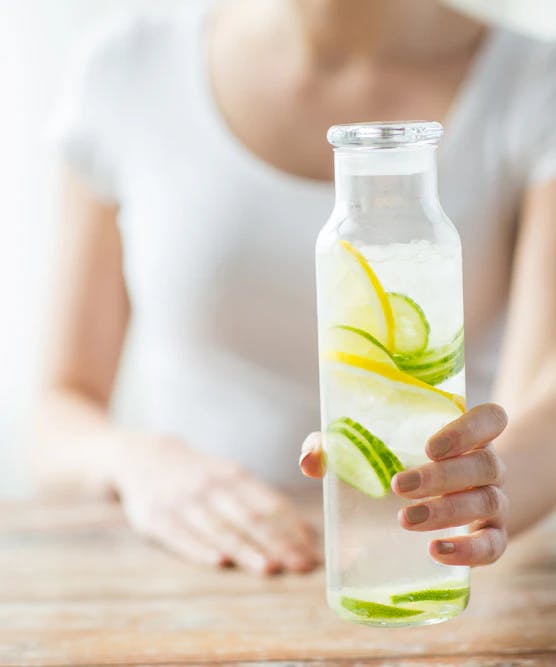7 Bad Things That Happen To Your Body When You’re Dehydrated
After oxygen, water is the most important staple for our bodies. Without it, we die within a matter of days. We need water—clean water— to live. Surprise, surprise!

Actually, even though good H2O intake seems pretty basic, it’s often neglected or swapped for tastier but definitely less-effective substitutes, like juice/coffee/soda/tea. Stats show that an average of 75% (!) of Americans are dehydrated. So most of us don’t drink enough water. What happens then?
Symptoms and Side-Effects of Dehydration
Slow Brain Function
Did you know that our brains are 80% water?! That means if it becomes water-deficient, it can’t function properly. Results = brain fog, headaches, inability to concentrate, and even irritability and mood swings can kick in.
Bad Breath / Digestion Issues
No one likes it. When there’s not enough water to keep the saliva clear, bacteria in the mouth builds up and emits the bad-breath smell. The breath also gives an idea of the gut’s state of health. Dehydration is a huge factor in constipation, which is when the bowels aren’t moving easily, if at all. Without sufficient water intake, the intestines dry up and can’t digest/absorb food or eliminate bowels properly. This then results in a waste build-up that starts rotting in the gut, which also promotes unhealthy intestinal bacteria. It gets even worse if a person eats a lot of fiber without hydrating to move it.
When there’s not enough water to keep the saliva clear, bacteria in the mouth builds up and emits the bad-breath smell.
Removing Toxins from the Body
We need adequate water levels for healthy blood flow, lymph fluid circulation, and detoxing. In the case of dehydration, the body is unable to eliminate the accumulation of toxins and acidic waste. An environment is then created that makes the “filter” organs—the bladder, kidneys, and the liver—more prone to infection and inflammatory issues.
Heavy Periods
The above also relates to menstrual cycles. We definitely don’t feel on top of the world during our periods, but we’ll feel worse and our periods will be heavier if we’re not flushing enough to keep everything moving.
Fatigue
Water is the most vital source of energy for the body. Dehydration inhibits normal lymphatic drainage, and when our lymph bottles-up we tend to feel swollen and sluggish. Dehydration also slows the body’s enzymic activity, resulting in fatigue. Body systems go haywire because they can’t work correctly and are then over-working, so energy reserves feel drained. If you have problems with basic functions like circulation and digestion, you won’t really feel chipper or up to exercising much, or even thinking about much except feeling gross.
Dehydration inhibits normal lymphatic drainage, and when our lymph bottles-up we tend to feel swollen and sluggish.
Weight Gain
We all get food cravings. But when we’re dehydrated, we tend to confuse thirst with hunger. We often think we’re hungry and eat more than we need instead of hydrating first/enough. When a body is dehydrated, it can't properly digest/absorb food. Digestion will also take longer, so it takes longer to feel satisfied. It’s then easy to overeat because we don’t feel full enough. Poor absorption/digestion can also create inflammation that contributes to weight gain.
Dry Skin / Lips
Like the brain, the skin needs adequate water for its health, along with the intake of good fats; when we don’t get enough, our skin/lips get dry. Then comes another beauty issue…
The skin needs adequate water for its health, along with the intake of good fats; when we don’t get enough, our skin/lips get dry.
As the biggest organ of the body, the skin acts as a huge filter. Without proper hydration to assist toxin elimination, that filter gets dirty, becoming more prone to skin problems/breakouts and less able to combat major irritants. Chronic dehydration also contributes to premature skin wrinkling and discoloration.
What To Do about It
If you can identify with any of the above issues, maybe make better water intake first on the priority list. It’s recommended that you drink half your body weight in ounces per day. For example, a person who weighs 140 lbs. should drink about 70 oz. of water (besides other liquids) per day, and more with outside exercise.
It’s also important to drink purified/filtered water to avoid all the fluoride/chlorine and other chemicals in city tap water. Lemon water and (unsweetened) coconut water are high in electrolytes, so they also help to hydrate quickly. For all the coffee lovers out there, don’t consider it as part of water intake. Same with alcohol, which actually dehydrates. It’s best to drink three cups of water for every cup of alcohol.
Closing Thoughts
Water is a critical lubricant for our organs—the brain, the stomach/intestines, liver, skin—and overall functioning of our body systems. If our systems aren’t working correctly to flush out irritants and maintain health, then health won’t be maintained! If we feel out-of-whack when there’s one issue going on, guess what: dehydration causes multiple issues! Granted, hydrating isn’t the only thing that keeps us healthy, but it does a lot to strengthen our bodies’ immunity.
For those of us in college, let’s try to keep tabs on that water bottle! It’s easy to get absorbed in classes/homework, but if we make it a goal to drink a certain amount by certain times, it’ll eventually become a good habit.